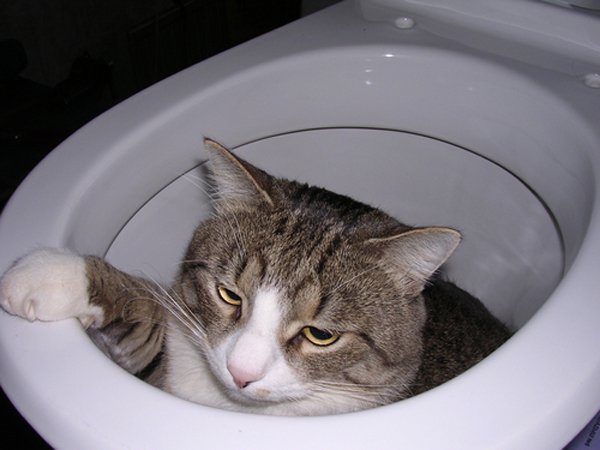Avoid Clogs and Damage: Don't Flush Cat Poop Down Your Toilet - Professional Insights
Avoid Clogs and Damage: Don't Flush Cat Poop Down Your Toilet - Professional Insights
Blog Article
We've discovered the article pertaining to Don’t flush cat feces down the toilet listed below on the net and figured it made sense to discuss it with you on this site.

Intro
As pet cat proprietors, it's vital to bear in mind how we deal with our feline pals' waste. While it may seem hassle-free to flush pet cat poop down the toilet, this practice can have detrimental consequences for both the setting and human health and wellness.
Environmental Impact
Flushing cat poop presents harmful microorganisms and bloodsuckers into the water system, posing a substantial risk to aquatic ecosystems. These impurities can negatively affect aquatic life and compromise water high quality.
Health and wellness Risks
In addition to environmental concerns, flushing feline waste can additionally position wellness risks to humans. Pet cat feces may have Toxoplasma gondii, a parasite that can create toxoplasmosis-- a potentially extreme health problem, especially for expecting ladies and people with damaged immune systems.
Alternatives to Flushing
The good news is, there are safer and much more liable methods to deal with feline poop. Think about the adhering to options:
1. Scoop and Dispose in Trash
The most usual technique of taking care of feline poop is to scoop it right into a naturally degradable bag and throw it in the trash. Make certain to use a dedicated clutter scoop and deal with the waste without delay.
2. Usage Biodegradable Litter
Opt for biodegradable cat litter made from products such as corn or wheat. These clutters are environmentally friendly and can be securely disposed of in the garbage.
3. Bury in the Yard
If you have a backyard, take into consideration hiding pet cat waste in an assigned area away from vegetable gardens and water resources. Be sure to dig deep enough to prevent contamination of groundwater.
4. Install a Pet Waste Disposal System
Purchase an animal garbage disposal system especially created for feline waste. These systems utilize enzymes to break down the waste, minimizing smell and environmental impact.
Conclusion
Accountable pet possession expands past offering food and sanctuary-- it additionally includes proper waste management. By refraining from purging cat poop down the commode and going with alternate disposal methods, we can minimize our environmental footprint and secure human health.
Why Can’t I Flush Cat Poop?
It Spreads a Parasite
Cats are frequently infected with a parasite called toxoplasma gondii. The parasite causes an infection called toxoplasmosis. It is usually harmless to cats. The parasite only uses cat poop as a host for its eggs. Otherwise, the cat’s immune system usually keeps the infection at low enough levels to maintain its own health. But it does not stop the develop of eggs. These eggs are tiny and surprisingly tough. They may survive for a year before they begin to grow. But that’s the problem.
Our wastewater system is not designed to deal with toxoplasmosis eggs. Instead, most eggs will flush from your toilet into sewers and wastewater management plants. After the sewage is treated for many other harmful things in it, it is typically released into local rivers, lakes, or oceans. Here, the toxoplasmosis eggs can find new hosts, including starfish, crabs, otters, and many other wildlife. For many, this is a significant risk to their health. Toxoplasmosis can also end up infecting water sources that are important for agriculture, which means our deer, pigs, and sheep can get infected too.
Is There Risk to Humans?
There can be a risk to human life from flushing cat poop down the toilet. If you do so, the parasites from your cat’s poop can end up in shellfish, game animals, or livestock. If this meat is then served raw or undercooked, the people who eat it can get sick.
In fact, according to the CDC, 40 million people in the United States are infected with toxoplasma gondii. They get it from exposure to infected seafood, or from some kind of cat poop contamination, like drinking from a stream that is contaminated or touching anything that has come into contact with cat poop. That includes just cleaning a cat litter box.
Most people who get infected with these parasites will not develop any symptoms. However, for pregnant women or for those with compromised immune systems, the parasite can cause severe health problems.
How to Handle Cat Poop
The best way to handle cat poop is actually to clean the box more often. The eggs that the parasite sheds will not become active until one to five days after the cat poops. That means that if you clean daily, you’re much less likely to come into direct contact with infectious eggs.
That said, always dispose of cat poop in the garbage and not down the toilet. Wash your hands before and after you clean the litter box, and bring the bag of poop right outside to your garbage bins.
https://trenchlesssolutionsusa.com/why-cant-i-flush-cat-poop/

Do you really like reading about Can You Flush Cat Poop Down The Toilet?? Try to leave a short review further down. We will be delighted to find out your thinking about this blog entry. We hope that you visit us again in the future. Do you know somebody who is very much interested in Can You Flush Cat Poo or Litter Down the Toilet?? Feel free to promote it. I praise you for your time. Don't forget to check our blog back soon.
Free Estimates Report this page